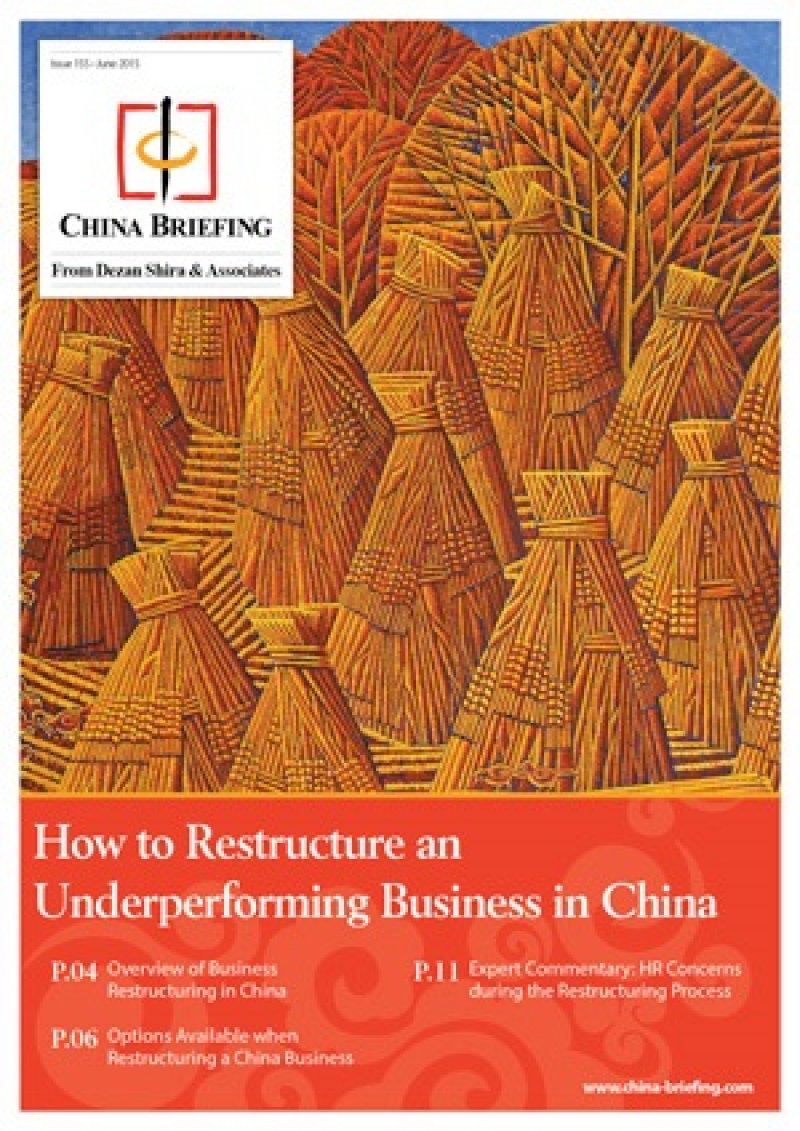Living to Fight Another Day: Putting a Chinese Company in “Dormancy”
By Dezan Shira & Associates
Editor: Nathan Wakelin-King
What happens when a company enters the China market, fails in its initial efforts, but plans to come back later and try again?
Even if the product is identical, business success in China often requires differing strategies to what was successful in the Western world. A company may decide to halt its China operations, reassess its business strategy and management processes, and try again a few years later with a smarter strategy and/or more resources.
Putting a company in dormancy essentially means putting it in limbo – no income, minimal payments, shorter and therefore simpler tax audits – but crucially, the company is still registered, and can be revived by investors when required. This avoids the costly process of shutting down and reregistering.
The idea of corporate dormancy as an official legal status is not accepted in China. However, a company can achieve a quasi- dormant status: that is to say, maintaining a company legally registered in China for the minimum possible ongoing costs, ready for a future foray into China.
![]() RELATED: Business Advisory Services from Dezan Shira & Associates
RELATED: Business Advisory Services from Dezan Shira & Associates
Why not simply shut down and leave?
Legally dissolving and deregistering a company in China is expensive and time consuming. If a company has plans of re-entering the China market, then the costs of deregistering may be more than just keeping a company running on “sleep mode” over the short to medium term.
Companies should familiarize themselves with the legal procedures for deregistering a company in China: China Briefing has written on this before, and Dezan Shira can help with many of the required procedures.
Managers should avoid informally “shutting shop” and abandoning without going through the proper procedures: companies and individuals may be put on a black list by Chinese authorities, which will prevent them from registering another business in China or even setting foot in the country. There have even been cases where foreign managers have even been prevented from leaving the country due to unresolved debts of their WFOE in China.
De Facto Dormancy: Requirements
As mentioned, dormancy as a concept is not officially recognized in Chinese corporate law. The aim is to maintain the company at minimum cost, while complying with China’s corporate laws.
- Tax Filing Requirements: Companies in China need to file tax returns (quarterly, monthly, and annually) with the tax bureau, even if there are little or no business activities recorded. Given that the operations of the “sleeping” company have been reduced to next to nothing, the report will be relatively simple to write. Nevertheless, this reporting is an important area of legal compliance, no matter how reduced a company’s China operations may be.
- Report with the AIC (Administration of Industry and Commerce): As part of maintaining the business license, annual reports must be submitted to the AIC in China. Failing to submit these reports leads to legal restrictions being placed on the company; not supplying the report for three years results in the company being put on a blacklist.
- Maintaining an Office Lease: To maintain the business license in China, a company must maintain a physical address.. A company could consider moving premises to a cheaper rented location.
Note, however, that this requires notifying government authorities of the change of address as part of maintaining the business license. An address that is in a residential area is highly unlikely to be approved. It’s therefore advisable to check that the new address satisfies corporate registration requirements, and that adequate supporting documents for company registration can be acquired from the landlord, before signing the lease agreement. - Maintaining a Corporate Bank Account: In order to maintain the company’s status in China, a corporate bank account is required for practical reasons. These include paying for rent, compliance and accounting requirements, and other office overheads. In addition, the account balance would be reviewed and verified during the annual audit. Without a proper bank account, the company may not be able to complete the annual audit and pass the AIC annual inspection. The bank account should be recorded and filed with the local tax bureau.
Technically, this company is still considered a profit-making structure. This means that it may come under higher regulatory scrutiny if it poses losses for multiple years, and may possibly have the business license revoked.
Conclusion
Dormancy is obviously not the only option for a company needing to temporarily exit the China market. Other options include using the WFOE as a cost center (similar to a representative office), divesting (selling assets, equity, etc.), or outright closure and deregistration.
Choosing to put a company into dormancy in China is not explicitly sanctioned by the government, but a de facto dormancy is within the bounds of Chinese law and often cheaper than the alternatives, if a company is planning a re-entry.
Regardless of what option is chosen, complying with all the laws and procedures will save time, trouble and money in the long-term.
|
Asia Briefing Ltd. is a subsidiary of Dezan Shira & Associates. Dezan Shira is a specialist foreign direct investment practice, providing corporate establishment, business advisory, tax advisory and compliance, accounting, payroll, due diligence and financial review services to multinationals investing in China, Hong Kong, India, Vietnam, Singapore and the rest of ASEAN. For further information, please email china@dezshira.com or visit www.dezshira.com. Stay up to date with the latest business and investment trends in Asia by subscribing to our complimentary update service featuring news, commentary and regulatory insight. |
![]()
How to Restructure an Underperforming Business in China
In this issue of China Briefing magazine, we explore the options that are available to foreign firms looking to restructure or close their operations in China. We begin with an overview of what restructuring an unprofitable business in China might entail, and then take an in-depth look at the way in which a foreign company can go about the restructuring process. Finally, we highlight some of the key HR concerns associated with restructuring a China business.
 Selling, Sourcing and E-Commerce in China 2016 (First Edition)
Selling, Sourcing and E-Commerce in China 2016 (First Edition)
This guide, produced in collaboration with the experts at Dezan Shira & Associates, provides a comprehensive analysis of all these aspects of commerce in China. It discusses how foreign companies can best go about sourcing products from China; how foreign retailers can set up operations on the ground to sell directly to the country’s massive consumer class; and finally details how foreign enterprises can access China’s lucrative yet ostensibly complex e-commerce market.
 An Introduction to Doing Business in China 2015
An Introduction to Doing Business in China 2015
Doing Business in China 2015 is designed to introduce the fundamentals of investing in China. Compiled by the professionals at Dezan Shira & Associates, this comprehensive guide is ideal not only for businesses looking to enter the Chinese market, but also for companies that already have a presence here and want to keep up-to-date with the most recent and relevant policy changes.
- Previous Article Die Beantragung von DBA-Vergünstigungen in China
- Next Article Intellectual Property Rights for SMEs in China’s ICT Industry





























